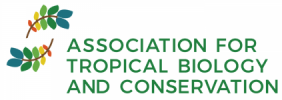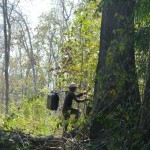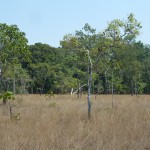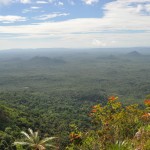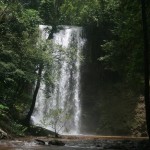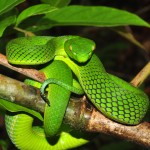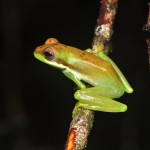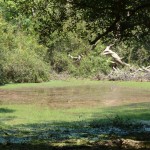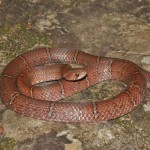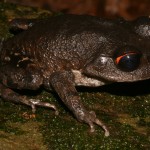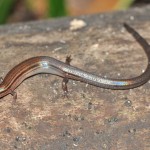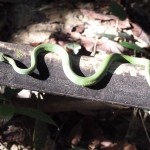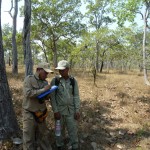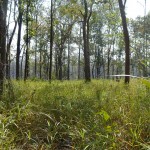The 2015 Annual Meeting of the ATBC Asia-Pacific Chapter will be held on the banks of the Mekong River, at the Himawari Hotel Apartments in Phnom Penh, Cambodia, from 30 Mar – 2 April. The meeting will be hosted by the Royal University of Phnom Penh, and the Centre for Biodiversity Conservation, and local conservation NGOs. ATBC President Dr Susan Laurance will be joining us for the event.
For the full meeting website please navigate here.
- Landscape of the Cardamoms.
- Type local of L. mouhoti
- Vogel’s green pit viper (Triemeresurus vogeli), is known from the Cardamoms
- Green blood turquoise bone frog (Chiromantis samkosensis) is endemic to Cambodia’s Cardamoms.
- Kampuchea kukri snake (Oligodon kampucheaensis), this species is known from one specimen in the Cardamoms.
- Mouhot’s litter frog (Leptobrachium mouhoti) (Easter Cambodia)
- Earless skink (Lygosoma veunsaiensis), poorly known as it was described in 2012 based on a single specimen from Veun Sai, northeastern Cambodia.
MEETING THEME The 2015 conference will bring together researchers, students, biodiversity specialists, conservation practitioners, policy makers, universities, government agencies and non-government organizations from around the Asia-Pacific region under the theme: ‘The Future of Biodiversity in Tropical Asia: addressing local and global challenges
MEETING OBJECTIVES In accordance with the general goals of the Association for Tropical Biology and Conservation, the objectives of the Phnom Penh meeting are:
- To promote and improve cooperation, communication, and interchange among all people interested in the study, conservation, and/or management of any of the components and/or processes present in tropical ecosystems of the Asia – Pacific region.
- To provide a space where the most recent findings related to tropical biology and/or conservation can be presented and discussed, in order to catalyze further advancement.
- To encourage and facilitate research in all aspects of tropical biology and conservation.
- To support the education of students at both undergraduate and graduate levels, as well as to assist them in the development of their careers.
- To acknowledge and honor the work of researchers who have had an outstanding long-term impact on the development of tropical biology and/or conservation.
- To promote awareness in the general public of the importance of studying and conserving tropical ecosystems.
- To link ATBC with conservation initiatives in Cambodia and the Asia – Pacific region.
BIODIVERSITY RESEARCH AND CONSERVATION IN CAMBODIA Cambodia supports a rich biodiversity yet is one of the least known countries worldwide. In addition to forming an important part of the Indo-Burma Hotspot, containing four Global Ecoregions and 40 Important Bird Areas, it possesses many of the best remaining forests and wetlands in mainland Southeast Asia, with countless endemic and globally threatened species. Though knowledge of Cambodian biodiversity remains limited, recent years have seen an astonishing rise in the number of species documented. Much of this research has been led by international biologists however, due to the chronic shortage of Cambodian scientists. As a consequence, Cambodia’s current ability to manage its natural heritage is severely hampered both by a lack of skilled people and biological information. As the country moves towards greater development and prosperity, there needs to be a clearer understanding of how to manage and use its natural heritage wisely. Natural resources are the mainstay of Cambodia’s economy: more than 80% of Cambodians depend directly on natural resources for subsistence and income, and all utilize wild resources such as fish and timber. With pressures on biodiversity and the environment increasing, there is a risk of losing much of this natural wealth forever; to the detriment of present and future generations. As a result, the lack of national capacity and reliable biodiversity data has been highlighted in all recent priority-setting exercises, including the National Biodiversity Strategy and Action Plan.
MEETING PROGRAM Call for symposia ATBC invites proposals for symposia for its 2015 meeting in Phnom Penh Cambodia under the theme “The Future of Biodiversity in Tropical Asia: addressing local and global challenges”. Proposals are encouraged to address the meeting theme if appropriate. Subjects of broad interest to tropical biology and conservation will also be considered for symposia. Deadline 30 November 2014, submit your proposal here.
Fellowships – ATBC – Asia Chapter is offering a limited number of fellowships to participants from lower-income institutions. The fellowship are ~$US500 each and will be awarded to participants from lower-income institutions presenting high quality papers (poster or oral) at the meeting. Preference will be given to younger scientists, conservationists, officials and policy makers. Applicants should first register for the meeting, then submit an Abstract.
INVITED SPEAKERS
- Dr William Laurance, James Cook University, Australia – Tropical logging and roads: Avoiding a fatal synergism for forests
- Dr Frank Rheindt, National University of Singapore – Conservation Genomics of Tropical Non-Model Species
- Dr Ryan Chisholm, National University of Singapore – Mathematics in the jungle: informing tropical conservation with quantitative theory
- Dr Richard Corlett, Xishuangbanna Tropical Botanical Garden, China – Welcome to the Anthropocene; what should we do now?
- Dr Nick Souter, Royal University of Phnom Penh, Cambodia – Ten years of the Masters of Science in Biodiversity Conservation at the Royal University of Phnom Penh
- Dr David Westcott, CSIRO, Atherton, Australia – Living at a landscape scale – flying-fox movement and its consequences
- Dr Madhu Rao, Wildlife Conservation Society, Asia Programs – The extinction crisis and the effectiveness of protected areas in Southeast Asia
Conference Registration Rates ATBC recognizes the disparity in incomes among our participants from countries across the development spectrum. We are offering registration at discounted rates for participants who are based in institutions in developing countries and least developed countries. Special rates for ATBC members. To join the ATBC and enjoy reduced registration rates click here.
Registration fees are in US dollars and includes the welcome dinner on 30 March, access to all symposia sessions during 31 March – 2 April, a meeting package including conference abstracts, lunch and coffee breaks. We invite individuals and organizations to sponsor students and conservationists from these countries to attend the meeting and/or join one of the conference workshops. If you are in a position to be a sponsor please contact us at asia@tropicalbio.org.
GENERAL |
||||
Country |
Category |
Early (Until 31 Dec) |
Late (1 Jan – 30 Mar) |
One day * |
Developed |
ATBC Member |
450 |
550 |
150 |
Non Member |
520 |
620 |
220 |
|
Developing** |
ATBC Member |
250 |
300 |
75 |
Non Member |
300 |
350 |
125 |
|
Least developed*** |
REGISTRATION WITH ATBC MEMBERSHIP |
200 |
250 |
100 |
Student |
||||
Country |
Category |
Early (Until 31 Dec) |
Late (1 Jan – 30 Mar) |
One day * |
Developed |
ATBC Member |
225 |
325 |
75 |
Non Member |
275 |
375 |
125 |
|
Developing** |
ATBC Member |
150 |
200 |
60 |
Non Member |
200 |
250 |
100 |
|
Least developed*** |
Registration with ATBC Membership |
150 |
200 |
90 |
* offered to Cambodia-based participants only **Includes China, Fiji, India, Indonesia, Malaysia, Papua New Guinea, Philippines, Sri Lanka, Thailand, Vietnam ***Includes Cambodia, Bangladesh, Bhutan, Lao PDR, Myanmar, Nepal
To make payments for meeting registration please navigate here.
MEETING LOGISTICS
Registration now open! Please click here to register for the meeting, then pay by 31 December 2014 to get the early bird rate!
Please note – payments for meeting registration will be done separately. ATBC will notify all registrants when the payment portal is ready to accept payments. Registered participants will be able to pay online via Paypal, or via bank transfer.
Symposia submission deadline 30 November 2014
Early-bird registration deadline 31 December 2014
Abstract submission deadline 31 January 2015
Late registration deadline 31 January 2015
Courses and Workshops ATBC is organizing a number of training courses and workshops for students and conservationists around our Phnom Penh meeting. This will include several popular courses that are our trademark, as well as some new offerings. The courses are aimed to develop capacity and skills in a range of areas needed by today’s tropical biologists and conservation scientists. These special events are open to all ATBC members and we encourage participants from developing countries where the instruction is not normally available in learning institutions. At this time, we are pleased to announce the following;
- Basic Statistics: Experimental Design & Data Analysis using Linear Models (24 – 29 March 2015) by Kyle Tomlinson
- Wildlife Statistics Bootcamp (19 – 29 March 2015) by Mike Meredith (WCS Malaysia)
- GIS Workshop (24 – 29 March 2015) by Alice Hughes
- Camera-trap database workshop (30 March 2015) by Jim Sanderson
- Proposal Writing Workshop (30 March 2015) by Matt Linkie. For information please send an email to <matthew.linkie@fauna-flora.org>
The workshops will be held at the Frangipani Hotel and Spa, a delightful venue near the bustling Russian Market in south central Phnom Penh. To keep costs to a minimum all instructors are giving their time for free.
Register for courses and workshops here.
To pay for courses and workshops please navigate here.
Accommodation There is a wide range of options for accommodation in Phnom Penh to suit all budgets. The organizing committee through our local contact Tnaot Khmer has contacted some local hotels to offer discounts to conference participants. Please note that no rooms have been booked in advance in any of the hotels listed. All bookings are on a “first come, first served” basis. Participants are responsible for making their own bookings, airport transfers or other special arrangements with the hotels. Below are hotels we recommend ranging from budget through high-end hotels. All room rates are in US Dollars per night, from as low as $20 for a twin room i.e. $10/night/person. No hotel we are recommending costs more than $95/night. When making bookings with these hotels please mention “ATBC 2015 Conference – Tnaot Khmer”.
Budget ($20 – $35/night)
1) Frangipani Living Arts Hotel and Spa http://www.frangipanilivingarts.com/ #15, Street 123, Toul Tom Pong I, Khan Chamkarmon, Phnom Penh. This is the venue for our workshops. 10 minutes by tuk-tuk from the conference venue. Superior single or double $30. Price includes breakfast. Contact <reservations@frangipanihotel.com>
2) Golden Gate Hotel http://www.goldengatehotels.com/ #9, Street 278, Sangkat Beng Keng Kang. 21 minutes walk or 5 minutes by tuk-tuk from the conference venue. Standard single $18; Standard twin $26; Deluxe twin $33; Deluxe triple $50. Price includes breakfast and laundry. Contact <reservation@goldengatehotels.com>
3) Nawin Guesthouse http://www.nawinguest.com/ 29Eo, Preah Ang Makhak Vann (St. 178), Sangkak Chey Chumnas. 12 minutes walk or 3 minutes by tuk-tuk from the conference venue; Twin $20-25, breakfast $2 extra. 10 rooms available only: 50% deposit is required. Contact <bookingnawinguest@gmail.com>
Medium-range ($35 – 60)
4) River Home Hotel http://riverhomehotel.com/ 463 corner of Sisovath Road, Street 258. 4 minutes walk from the conference venue. Superior single $50; Superior twin/double $55. Contact <gm@riverhomehotel.com>
5) King Grand Boutique Hotel http://www.kinggrandboutiquehotel.com/ #18, Street 258. 5 minutes walk from the conference venue. Standard $35; Deluxe twin $45. Contact <info@kinggrandboutiquehotel.com>
6) Villa Langka http://www.villalangka.com/ #14, Street 282. 19 minutes walk or 4 minutes by tuk-tuk from the conference venue. Standard single $45; Standard double $55. Contact <info@villalangka.com>
7) Landscape Hotel http://www.landscapehotel.
8) Bougainvillea Hotel http://www.
High-end ($60 – 95)
9) Himawari Hotel Apartments (the conference venue ) http://www.himawarihotel.com/ 313 Sisowath Quay, Phnom Penh. Studio suite $95. Contact Ms Sreng Davy <sales_exec3@himawari.com.kh>
10) The Plantation http://theplantation.asia/ #28, Street 184. 16 minutes walk or 4 minutes by tuk-tuk from the conference venue. Superior single $81; Superior double $91. Contact <reservation@theplantation.
Field trips Participants will have the opportunity after the meeting to visit a selection of the best ecotourism projects in Cambodia, where local communities benefit from participating in the conservation of birds, elephants, gibbons, and Mekong dolphins, in the Northern and Eastern Plains, Tonle Sap and Prey Nup mangroves. The field trips will be arranged with support from local conservation organizations.
MEETING ORGANIZATION Local Organizing Committee
- Prof Phal Des (Chair), Vice-Rector, Royal University of Phnom Penh (RUPP)
- Antony Lynam (Co-chair), Secretary, ATBC Asia –Pacific Chapter, and Wildlife Conservation Society, Asia Program asia@tropicalbio.org
- Nick Souter, Project Manager, Centre for Biodiversity Conservation, RUPP
- Nophea Sasaki, Associate Professor, Graduate School of Applied Informatics, University of Hyogo, Japan
- Neang Thy, CECG Manager, Fauna & Flora International, Cambodia
- Thi Sothearen, Centre for Biodiversity Conservation, RUPP
- Alex Diment, Senior Technical Advisor, Wildlife Conservation Society, Cambodia Programme
Scientific committee:
- Neil Furey (Chair), Fauna & Flora International, Cambodia n.furey.ffi@gmail.com
- Tommaso Savini , Conservation Ecology Program, King Mongkut’s University of Technology Thonburi, Thailand tommasosavini@gmail.com
- Aldrin Mallari, Fauna & Flora International, The Philippines
- David Westcott, CSIRO Atherton, Australia
- Steve Turton, James Cook University, Cairns, Australia
- Ahimsa Campos-Arceiz, University of Nottingham, Malaysia
- Catherine Yule, Monash University, Malaysia
- Soumya Prasad, Jawaharlal Nehru University, New Delhi
- Alice Hughes, Xishuangbanna Tropical Botanical Garden, China
Course and Workshop Committee
- Alice Hughes (Chair) dr_achughes@hotmail.co.uk
- Soumya Prasad
- Rhett Harrison, CGIAR, Kunming, China
- Robert Bagchi, ETH, Zurich, Switzerland
- Nick Souter
Event Organizer Kung Sophea, Tnaot Khmer
